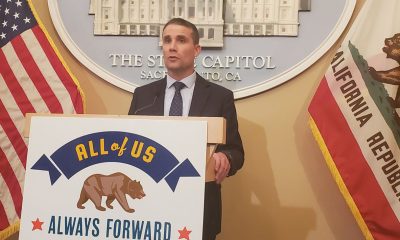Business
2014 Was Best Hiring Year Since ’99; Jobless Rate 5.6 Pct.

In this Oct. 23, 2014 file photo, Joe Wilhelm, left, a recruiter with payment processing company First Data Corp., shakes hands with U.S. Army Spc. Vincent Knowles, at a job fair that was part of a “transition summit” intended to provide employment and educational information to soldiers who may exit military service in the next year, at Joint Base Lewis-McChord, Wash. The Labor Department releases employment data for December 2014 on Friday, Jan. 9, 2015. (AP Photo/Ted S. Warren, File)
CHRISTOPHER S. RUGABER, AP Economics Writer
WASHINGTON (AP) — The United States capped its best year for hiring in 15 years with a healthy gain in December, and the unemployment rate hit a six-year low. The numbers support expectations that the United States will strengthen further this year even as overseas economies stumble.
Employers added 252,000 jobs last month and 50,000 more in October and November combined than the government had previously estimated, the Labor Department said Friday. The unemployment rate dropped to 5.6 percent from 5.8 percent in November. The rate is now at its lowest point since 2008.
Still, wage growth remains weak. Average hourly pay slipped 5 cents in December. And one reason the unemployment rate fell had nothing to do with more hiring: Many of the jobless gave up looking for work and so were no longer counted as unemployed.
Even so, nearly 3 million more people are earning paychecks than at the start of 2014 — the best annual job gain since 1999. Gas prices have also plunged, which will give consumers — the main driver of the U.S. economy — a further boost in coming months.
Though December’s hiring didn’t match November’s huge 353,000 gain, monthly job growth in the final three months of 2014 averaged 289,000. That was up sharply from the 239,000 average for the third quarter of 2014.
“We are in a recovery that is accelerating,” said Michael Strain, an economist at the American Enterprise Institute, a conservative think tank.
The unemployment rate is now near the 5.2 percent to 5.5 percent range that the Federal Reserve considers consistent with a healthy economy — one reason the Fed has been expected to raise interest rates from record lows by midyear.
Yet for now, the plummeting oil prices and weak pay growth are helping keep inflation even lower than the Fed’s 2 percent target rate. Many economists think inflation may fail to reach even 1 percent this year. A result is that the Fed could feel pressure to avoid raising rates anytime soon.
“There is still room for stimulus without having to worry about inflation taking off,” Strain said.
Most economists forecast that the U.S. economy will expand more than 3 percent this year. If it does, 2015 would mark the first time in a decade that growth has reached that level for a calendar year.
In December, hiring was widespread across most industries. Construction firms added 48,000 jobs, the most since January. Manufacturers gained 17,000.
One industry where hiring slowed in December was retailing, which cut back after staffing up in November for the holiday shopping season.
Overall, American businesses have been largely shrugging off signs of economic weakness overseas and continuing to hire at solid rates. The U.S. economy’s steady improvement is especially striking compared with the weakness in much of the world.
Europe is barely growing, and its unemployment rate is nearly double the U.S. level. Japan, the world’s third-largest economy, is in recession. Russia’s economy is cratering as oil prices plummet. China is straining to manage a slowdown. Brazil and others in Latin America are struggling.
Fears about significantly cheaper oil spooked investors earlier this week before financial markets recovered. But most economists remain optimistic that lower energy prices will benefit U.S. consumers and many businesses.
The drop in average hourly pay last month to $24.57 followed a downward revision to November’s average pay gain. Hourly pay over the past two months has now risen just a penny.
During 2014, average wages rose just 1.7 percent, not much above the inflation rate, which was 1.3 percent. As hiring ramps up and the unemployment rate falls, those pressures should, at least in theory, compel employers to raise pay to attract workers. But that trend has yet to emerge.
“The continued listless performance of hourly earnings is an ongoing frustration,” Richard Moody, an economist at Regions Financial.
The fall in average pay may actually reflect economic strength, said John Silvia, chief economist at Wells Fargo. Silvia suggested that the healthy hiring of recent months means that “many of these new hires are entry-level workers and would be paid less” than experienced employees.
Last month, the number of unemployed fell 383,000 to 8.7 million. Fewer than one-third of people out of work found jobs; the rest stopped looking. The percentage of Americans who are either working or looking for work fell back to a 37-year low last touched in September.
The brightening jobs picture has healed some of the deep scars left by the Great Recession. The number of people who have been unemployed for more than six months fell 27 percent last year. And the number working part time who would prefer full-time work dropped 12 percent.
Still, to keep up with population growth since the recession began, the economy would need to create 4.9 million additional jobs, according to the Brookings Institution.
Economists expect more healing this year. Goldman Sachs estimates that additional spending on restaurants, auto dealers and other goods and services resulting from lower energy prices will lead to 300,000 more jobs this year than if oil prices had remained at their levels of six months ago.
Spending at retail stores and restaurants rose in November by the most in eight months, an early sign that Americans are spending some of the savings they are enjoying on gas-pump prices.
___
AP Economics Writer Josh Boak contributed to this report.
Copyright 2015 The Associated Press. All rights reserved. This material may not be published, broadcast, rewritten or redistributed.
Activism
Oakland Post: Week of April 24 – 30, 2024
The printed Weekly Edition of the Oakland Post: Week of April 24 – 30, 2024

To enlarge your view of this issue, use the slider, magnifying glass icon or full page icon in the lower right corner of the browser window. ![]()
Bay Area
State Controller Malia Cohen Keynote Speaker at S.F. Wealth Conference
California State Controller Malia Cohen delivered the keynote speech to over 50 business women at the Black Wealth Brunch held on March 28 at the War Memorial and Performing Arts Center at 301 Van Ness Ave. in San Francisco. The Enterprising Women Networking SF Chapter of the American Business Women’s Association (ABWA) hosted the Green Room event to launch its platform designed to close the racial wealth gap in Black and Brown communities.

By Carla Thomas
California State Controller Malia Cohen delivered the keynote speech to over 50 business women at the Black Wealth Brunch held on March 28 at the War Memorial and Performing Arts Center at 301 Van Ness Ave. in San Francisco.
The Enterprising Women Networking SF Chapter of the American Business Women’s Association (ABWA) hosted the Green Room event to launch its platform designed to close the racial wealth gap in Black and Brown communities.
“Our goal is to educate Black and Brown families in the masses about financial wellness, wealth building, and how to protect and preserve wealth,” said ABWA San Francisco Chapter President LaRonda Smith.
ABWA’s mission is to bring together businesswomen of diverse occupations and provide opportunities for them to help themselves and others grow personally and professionally through leadership, education, networking support, and national recognition.
“This day is about recognizing influential women, hearing from an accomplished woman as our keynote speaker and allowing women to come together as powerful people,” said ABWA SF Chapter Vice President Velma Landers.
More than 60 attendees dined on the culinary delights of Chef Sharon Lee of The Spot catering, which included a full soul food brunch of skewered shrimp, chicken, blackened salmon, and mac and cheese.
Cohen discussed the many economic disparities women and people of color face. From pay equity to financial literacy, Cohen shared not only statistics, but was excited about a new solution in motion which entailed partnering with Californians for Financial Education.
“I want everyone to reach their full potential,” she said. “Just a few weeks ago in Sacramento, I partnered with an organization, Californians for Financial Education.
“We gathered 990 signatures and submitted it to the [California] Secretary of State to get an initiative on the ballot that guarantees personal finance courses for every public school kid in the state of California.
“Every California student deserves an equal opportunity to learn about filing taxes, interest rates, budgets, and understanding the impact of credit scores. The way we begin to do that is to teach it,” Cohen said.
By equipping students with information, Cohen hopes to close the financial wealth gap, and give everyone an opportunity to reach their full financial potential. “They have to first be equipped with the information and education is the key. Then all we need are opportunities to step into spaces and places of power.”
Cohen went on to share that in her own upbringing, she was not guided on financial principles that could jump start her finances. “Communities of color don’t have the same information and I don’t know about you, but I did not grow up listening to my parents discussing their assets, their investments, and diversifying their portfolio. This is the kind of nomenclature and language we are trying to introduce to our future generations so we can pivot from a life of poverty so we can pivot away and never return to poverty.”
Cohen urged audience members to pass the initiative on the November 2024 ballot.
“When we come together as women, uplift women, and support women, we all win. By networking and learning together, we can continue to build generational wealth,” said Landers. “Passing a powerful initiative will ensure the next generation of California students will be empowered to make more informed financial decisions, decisions that will last them a lifetime.”
Business
Black Business Summit Focuses on Equity, Access and Data
The California African American Chamber of Commerce hosted its second annual “State of the California African American Economy Summit,” with the aim of bolstering Black economic influence through education and fellowship. Held Jan. 24 to Jan. 25 at the Westin Los Angeles Airport Hotel, the convention brought together some of the most influential Black business leaders, policy makers and economic thinkers in the state. The discussions focused on a wide range of economic topics pertinent to California’s African American business community, including policy, government contracts, and equity, and more.

By Solomon O. Smith, California Black Media
The California African American Chamber of Commerce hosted its second annual “State of the California African American Economy Summit,” with the aim of bolstering Black economic influence through education and fellowship.
Held Jan. 24 to Jan. 25 at the Westin Los Angeles Airport Hotel, the convention brought together some of the most influential Black business leaders, policy makers and economic thinkers in the state. The discussions focused on a wide range of economic topics pertinent to California’s African American business community, including policy, government contracts, and equity, and more.
Toks Omishakin, Secretary of the California State Transportation Agency (CALSTA) was a guest at the event. He told attendees about his department’s efforts to increase access for Black business owners.
“One thing I’m taking away from this for sure is we’re going to have to do a better job of connecting through your chambers of all these opportunities of billions of dollars that are coming down the pike. I’m honestly disappointed that people don’t know, so we’ll do better,” said Omishakin.
Lueathel Seawood, the president of the African American Chamber of Commerce of San Joaquin County, expressed frustration with obtaining federal contracts for small businesses, and completing the process. She observed that once a small business was certified as DBE, a Disadvantaged Business Enterprises, there was little help getting to the next step.
Omishakin admitted there is more work to be done to help them complete the process and include them in upcoming projects. However, the high-speed rail system expansion by the California High-Speed Rail Authority has set a goal of 30% participation from small businesses — only 10 percent is set aside for DBE.
The importance of Diversity, Equity and Inclusion (DEI) in economics was reinforced during the “State of the California Economy” talk led by author and economist Julianne Malveaux, and Anthony Asadullah Samad, Executive Director of the Mervyn Dymally African American Political and Economic Institute (MDAAPEI) at California State University, Dominguez Hills.
Assaults on DEI disproportionately affect women of color and Black women, according to Malveaux. When asked what role the loss of DEI might serve in economics, she suggested a more sinister purpose.
“The genesis of all this is anti-blackness. So, your question about how this fits into the economy is economic exclusion, that essentially has been promoted as public policy,” said Malveaux.
The most anticipated speaker at the event was Janice Bryant Howroyd known affectionately to her peers as “JBH.” She is one of the first Black women to run and own a multi-billion-dollar company. Her company ActOne Group, is one of the largest, and most recognized, hiring, staffing and human resources firms in the world. She is the author of “Acting Up” and has a profile on Forbes.
Chairman of the board of directors of the California African American Chamber of Commerce, Timothy Alan Simon, a lawyer and the first Black Appointments Secretary in the Office of the Governor of California, moderated. They discussed the state of Black entrepreneurship in the country and Howroyd gave advice to other business owners.
“We look to inspire and educate,” said Howroyd. “Inspiration is great but when I’ve got people’s attention, I want to teach them something.”
-

 Community2 weeks ago
Community2 weeks agoFinancial Assistance Bill for Descendants of Enslaved Persons to Help Them Purchase, Own, or Maintain a Home
-

 Activism3 weeks ago
Activism3 weeks agoOakland Post: Week of April 3 – 6, 2024
-

 Business2 weeks ago
Business2 weeks agoV.P. Kamala Harris: Americans With Criminal Records Will Soon Be Eligible for SBA Loans
-

 Community2 weeks ago
Community2 weeks agoAG Bonta Says Oakland School Leaders Should Comply with State Laws to Avoid ‘Disparate Harm’ When Closing or Merging Schools
-

 Activism2 weeks ago
Activism2 weeks agoOakland Post: Week of April 10 – 16, 2024
-

 Community1 week ago
Community1 week agoOakland WNBA Player to be Inducted Into Hall of Fame
-

 Community1 week ago
Community1 week agoRichmond Nonprofit Helps Ex-Felons Get Back on Their Feet
-

 City Government2 weeks ago
City Government2 weeks agoLAO Releases Report on Racial and Ethnic Disparities in California Child Welfare System
























































